LOOK AT BABY GROW
The first year is full of exciting changes. Your baby will begin to eat new foods and develop new skills. The way you respond will shape his understanding of how things work. “He learns that when he’s hungry, someone feeds him. When he’s uncomfortable, someone changes his diaper. And when he’s crying, someone picks him up,” says Veronica Hendrix, a nurse and lactation consultant.
As a parent, you play the most important role in the way your baby develops. Here are some milestones to look for and things you can do to make sure your baby has the healthiest start in life. If you are ever concerned about your baby’s development or feeding habits, talk to your health care provider or a WIC nutritionist. We’re here to help!
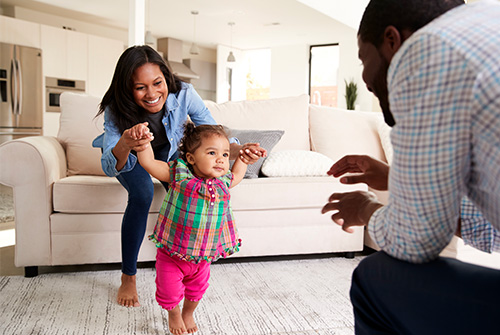
Great Job, Mom!
First year parenting tips:
- Breastfeed your baby for as long as you can. The American Academy of Pediatrics recommends breastfeeding until age 2 or longer if desired.
- If your baby drinks formula, she will need it until she is 1 year old.
- Touch and cuddle your baby.
- Talk, sing and read to your baby every day.
- Get regular medical checkups for your baby.
- Take your baby for routine immunizations at ages 2, 4, 6 and 12 months.
Remember:
- Every baby grows in their own way.
- Babies born early may take a little longer to develop than other infants of the same age.
- Ask your baby’s health care provider if you have any questions or concerns.
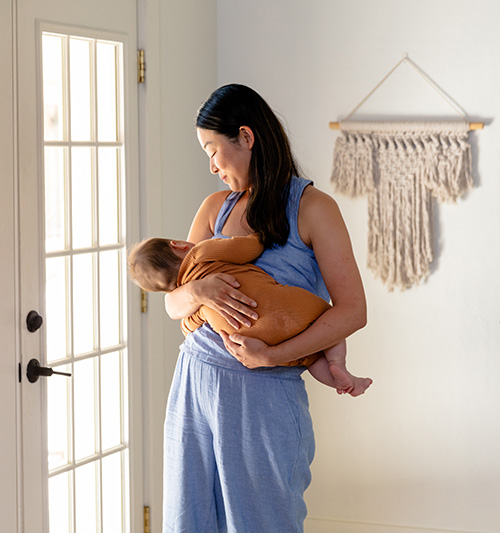
0-3 Months
Welcome little one! At 0-3 months old, your baby will:
- Drink only breastmilk, formula or a combination of both.
- Show hunger by:
- Moving his head from side to side and opening his mouth toward your breast or the bottle.
- Sucking on his hands and fingers.
- Clenching his fists.
- Crying; it’s a late sign of hunger so try not to wait till your baby starts crying. Feed your baby as soon as he shows you that he’s hungry. - Eat and sleep a lot without having any kind of schedule.
- Have plenty of wet and dirty diapers in a 24-hour period. Learn what to expect during your baby’s first month. Change dirty diapers as soon as you can to keep him from getting a rash or being uncomfortable.
- Cry often — sometimes crying is the only way that your baby can communicate. Be patient and ask for help if you find yourself getting frustrated. Never shake your baby.

At 2 months, most babies (75% or more) would be expected to:
- Watch you as you move.
- Smile when you smile or talk to him and react to loud sounds.
- Move his arms and legs.
- Hold his head up briefly when on his tummy.
Positive parenting tips:
- Pick your baby up when he cries. Hold him and snuggle often — you cannot spoil a baby.
- Your baby likes hearing your voice — talk, read and sing to him every day.
- Help your baby practice lifting his head up with tummy time. Lay your baby on his tummy while awake and put toys at eye level in front of him.
- Act excited and smile when your baby makes sounds.
- Have routines for daily activities to help your baby learn what to expect.
- Feed your baby on demand. Watch for his hunger and fullness signs.
- To learn more about baby behavior during those early days, take our online lesson “How Do I Know What My Baby Is Trying to Tell Me?”
- If you would like more information on feeding your newborn, check out our online lesson “Getting Ready for Baby.”
4-6 Months
At 4-6 months old, your baby will:
- Continue to drink only breastmilk, formula or a combination of both until about 6 months old.
- Sit with support and have good neck and head control.
- Be ready to try pureed foods at around 6 months. It is a good idea to talk with your health care provider or WIC nutritionist before starting solid foods. Choose foods with only one ingredient and wait three to five days after introducing each new food to be sure there are no food allergies. Once your baby starts solid foods, she will still need breastmilk, formula or a combination of both until 1 year old.
- Turn her head, push the spoon away or hold her mouth shut to tell you she’s done eating.
- Be ready to start learning to drink from a cup.
- By 6 months old, she will weigh at least twice as much as she did at birth.
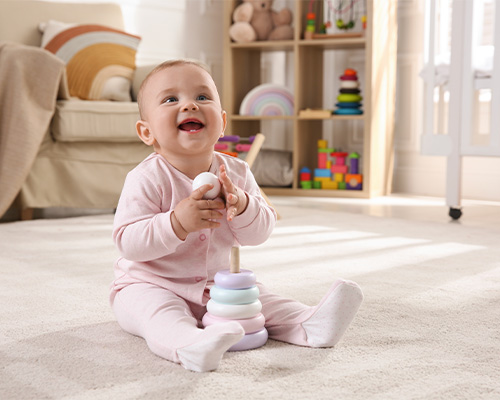
At 4 months, most babies (75% or more) would be expected to:
- Bring hands to her mouth.
- Look at her hands with interest.
- Turn her head toward the sound of a caregiver’s voice.
- Make cooing sounds like “oooo” and “aahh.”
At 6 months, most babies (75% or more) would be expected to:
- Put things in her mouth to explore them.
- Make squealing noises.
- Roll from tummy to back.
- Like to look at herself in a mirror.
Positive parenting tips:
- Hold your baby up while she sits. Let her look around while she learns to balance.
- Continue to breastfeed! Nurse in a dimly lit room or private area if your baby is easily distracted.
- When your baby looks at something, point to it and talk about it.
- Read colorful picture books to your baby.
- Put your baby on her tummy or back and put toys just out of reach; encourage her to roll over to reach the toys.
- To learn more about introducing solid foods to your baby, take our online lesson “Baby’s First Bites.”
7-9 Months
Mealtime is getting more exciting! At 7-9 months, your baby will:
- Bring his head toward the spoon.
- Take many tries before liking some foods.
- Like to play with a spoon, but not use it very well.
- Slowly get better at drinking from a cup.
- Be ready to try foods that are strained or mashed with a fork.
- Learn to move food to the sides of his mouth and chew.
- Still need breastmilk, formula or a combination of both until 1 year old.
- Need his gums and teeth cleaned twice a day.
- Start teething! Getting teeth doesn’t mean that your baby is too old to breastfeed. Sometimes, when a baby is teething, he may try to comfort his gums by biting down. There are many ways to help avoid this. If you are concerned about teething while breastfeeding, ask your WIC peer counselor or lactation consultant for help. Learn helpful tips in our online lesson, “Breastfeeding Beyond 6 Months.”
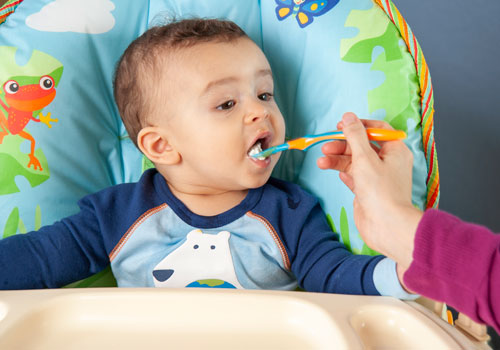
At 9 months, most babies (75% or more) would be expected to:
- Make different sounds like “mamamama” and “babababa.”
- Get to a sitting position and sit without support.
- Move things from one hand to the other.
- Look for objects when dropped out of sight (like a spoon or toy).
- React when you leave (look, reach for you, or cry).
- Lift his arms to be picked up.
Positive parenting tips:
- Say a quick and cheerful goodbye instead of sneaking away so your baby knows you are leaving, even if he cries. Your baby will learn to trust that you will always return to him. Let your baby know when you return by saying, “Mommy’s back!”
- Your baby enjoys showing off and getting praise. Ask for the behaviors you want to see. For example, instead of saying “don’t stand” say “time to sit” and congratulate the behavior.
- Play lots of games involving back-and-forth play, like rolling balls to each other, pushing toy cars and moving blocks into and out of a container.
- Play peek-a-boo and hide-and-seek.
- Continue reading to your baby and talk about the pictures in books.
10-12 Months
Your baby will get into everything! At 10-12 months, your baby will:
- Learn by making a mess! Be patient — your baby is just curious.
- Hold a spoon but need your help using it.
- Drink from a cup most of the time.
- Still need breastmilk, formula or a combination of both.
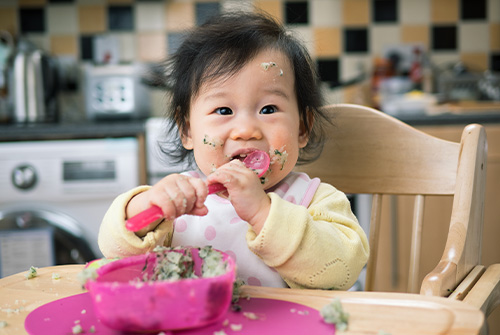
At 12 months, most babies (75% or more) would be expected to:
- Pick things up between thumb and pointer finger, like small bits of food.
- Look for things she sees you hide, like a toy under a blanket.
- Call a parent “mama” or “dada” or another special name.
- Understand “no” (pauses briefly or stops when you say it).
- Wave “bye-bye.”
- Pull herself up to stand.
Positive parenting tips:
- Give your baby time to get to know a new caregiver. Bring a favorite toy or blanket to help comfort her.
- Add words or phrases onto what your baby tries to say or what she points to.
- Help your baby play with blocks and toys that encourage her to use her hands. Pushing toys like a wagon will also help with her development.
- Hide toys and have your baby find them.
- Provide lots of safe space for her to explore.
- Talk to your health care provider if you are concerned about your baby’s growth and development.
If you are still concerned about your baby’s growth and development after discussing it with your health care provider, you can locate an Early Childhood Intervention (ECI) provider at 1-877-787-8999 or through the ECI website. You do not need a medical diagnosis or referral to have your baby evaluated.
Read more about ECI on this Navigate Life Texas website for families.

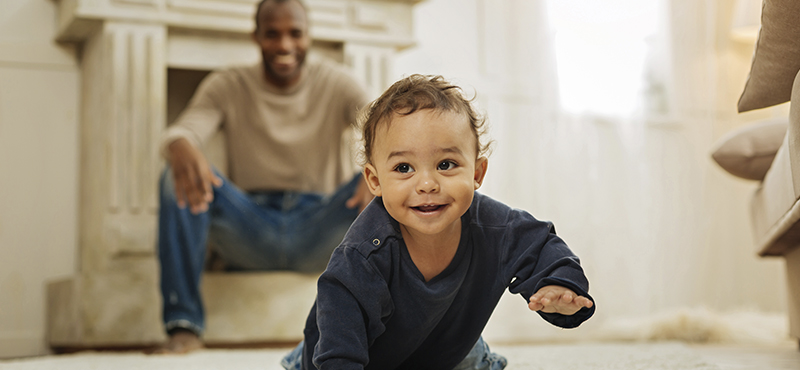

 Have any questions?
Have any questions?
